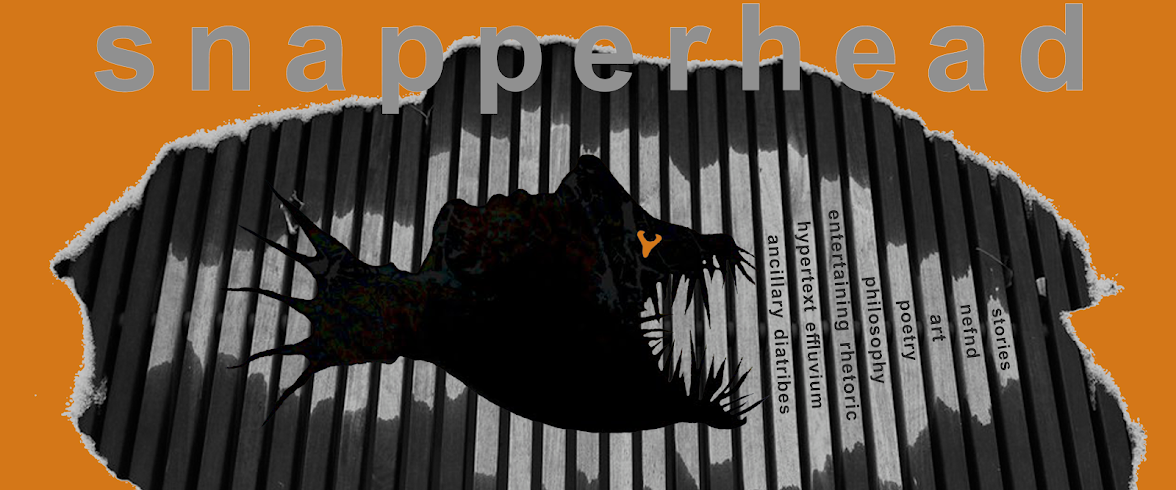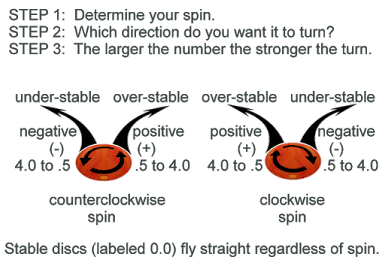A personal A-thru-Z of things ranging from minor irritants to the despicably horrid.

If you want to know what's really going on in a society or ideology, follow the money. If money is flowing to advertising instead of to musicians, journalists, and artists, then a society is more concerned with manipulation than with truth or beauty. If content is worthless, then people will start to become empty-headed and content-less. The combination of hive mind and advertising has resulted in a new kind of social contract. The basic idea of this contract is that authors, journalists, musicians, and artists are encouraged to treat the fruits of their intellects and imaginations as fragments to be given without pay to the hive mind. Reciprocity takes the form of self-promotion. Culture is to become precisely nothing but advertising. — Jaron Lanier,
You Are Not a Gadget (2010)

All that is necessary, as it seems to me, to convince any reasonable person that the Bible is simply and purely of human invention of barbarian invention is to read it. Read it as you would any other book; think of it as you would of any other; get the bandage of reverence from your eyes; drive from your heart the phantom of fear; push from the throne of your brain the coiled form of superstition then read the Holy Bible, and you will be amazed that you ever, for one moment, supposed a being of infinite wisdom, goodness and purity, to be the author of such ignorance and of such atrocity. — Robert G. Ingersoll,
The Gods (1876)

Are you a public smoker that whines about the self-righteousness and 'negativity' of some people who refuse to suck on burning tubes of paper filled with chemical-soaked chopped up leaves? OK, so you painfully attack our lungs and nasal passages with your perverted public pollution and we're supposed to be positive, pat you on the back, and tell you that everything is fine? Everything is not fine. You violate our bodies. You give us pain. You're no better than a rapist. Until you come to your senses, you are the enemy. — Duane Alan Hahn,
Random Terrain (.com)

Much of the public, and a dismaying number of psychiatrists, psychologists, and neuroscientists, mistakenly believe that if a behavior is influenced by genes or mediated by the brain then the actor cannot choose his actions. While every behavior has a biological correlate (and a genetic contribution) and every experience that changes behavior does so by changing the brain, the critical question is not whether brain changes occur (they do) but whether these changes block the influence of the factors that support self-control. — Gene M. Heyman,
Addiction: A Disorder of Choice (2009)

There are over 600 chemical ingredients that have been linked to cancer or are believed toxic to the reproductive system. Many are used to manufacture perfume and cologne. In 1986, the National Academy of Sciences grouped fragrances with insecticides, heavy metals, solvents, food additives and certain air pollutants as the six categories of chemicals that should be given high priority for neurotoxicity testing. According to their report, 95% of chemicals used in fragrances are synthetic compounds derived from petroleum. They include benzene derivatives, aldehydes and many other known toxic substances linked to cancer, birth defects and allergic reactions. — Djehuty Ma'at-Ra,
The Dangers of Perfume and Cologne (
dherbs.com)

Does he repeat himself, lose things, need reminders, or seem less interested in social activities or hobbies? Is he more forgetful, irritable, angry, agitated, or suspicious? Are you concerned about his judgment? Does he have trouble remembering words, difficulty operating household appliances, or become anxious when separated from family? Is he confused by time or misjudge how much time has elapsed? Have you noticed changes in personal hygiene, personality, or behavior? Has he started seeing, hearing or believing things that are not real? — Alzheimer Checklist,
Full Circle of Care (.org)

Every one of your acts of smallness and meanness throws light on the boundless wretchedness of the human animal. '
Why so tragic?' you ask. '
Do you feel responsible for all evil?' With remarks like that you condemn yourself. If, little man among millions, you were to shoulder the barest fraction of your responsibility, the world would be a very different place. Your great friends wouldn't perish, struck down by your smallness. — Wilhelm Reich,
Listen, Little Man! (1945)

It is best not to be hypocritical, but I would rather be an honest hypocrite than a person who tries to make truth conform around his or her own desires and imperfections. In other words, I would rather be an honest hypocrite than lie about my imperfections. — Lonnie Lee Best,
Hard Core Truth (.com)

Once master the machinery of Symbolic Logic, and you have a mental occupation always at hand, of absorbing interest, and one that will be of real use to you in any subject you may take up. It will give you clearness of thought—the ability to see your way through a puzzle—the habit of arranging your ideas in an orderly and get-at-able form—and, more valuable than all, the power to detect fallacies, and to tear to pieces the flimsy illogical arguments, which you will so continually encounter in books, in newspapers, in speeches, and even in sermons, and which so easily delude those who have never taken the trouble to master this fascinating Art. — Lewis Carroll,
Symbolic Logic, Part 1: Elementary (1896)

That inverted patriotism whereby the love of one's own nation is transformed into the hatred of another nation, and the fierce craving to destroy individual members of that other nation is no new thing. Wars have not always, or perhaps commonly, demanded for their origin and support the pervasion of such a frenzy among the body of the people. ... Only in recent times, and even now over but a small part of the world, has the great mass of the individuals of any nation been placed in such quick touch with great political events that their opinions, their passion, and their will have played an appreciable part in originating strife or in determining ... the political conduct of a war. — John A. Hobson,
The Psychology of Jingoism (1901)

Accurately details the paradox of low-to-middle income blue collar Americans voting against their own economic interests. — Review for Thomas Frank's
What's The Matter With Kansas? (2005)

Speech is ... a form of music. It has tones and timbres, pitches and rhythms. It can be loud or soft, punchy or laid back, fast or slow. But when you are talking, things are not organized in advance the way they are in a song, so you must improvise on the spot. Speaking is much like singing a song that hasn't been written yet. ... Remember, your voice is one third of the impression you make ... make that one third count. — Renee Grant-Williams,
Voice Power: Using Your Voice to Captivate, Persuade, and Command Attention (2002)

Isn't that the problem? That women have been swindled for centuries into substituting adornment for love, fashion (as it were) for passion? ... All the cosmetics names seemed obscenely obvious to me in their promises of sexual bliss. They were all 'firming' or 'uplifting' or 'invigorating'. They made you 'tingle'. Or 'glow'. Or 'feel young'. They were prepared with hormones or placentas or royal jelly. All the juice and joy missing in the lives of these women were to be supplied by the contents of jars and bottles. No wonder they would spend $20 for an ounce of face makeup or $30 for a half-ounce of hormone cream. What price bliss? What price sexual ecstasy? — Erica Jong,
How to Save Your Own Life (1977)

The media organizations in charge of vetting our images of war have become fewer and bigger — and the news more uniform and gung ho. Six huge corporations now control the major U.S. media ... As Phil Donahue, the former host of MSNBC's highest-rated show who was fired by the network in February 2003 for bringing on anti-war voices, told Democracy Now!: "We have more (TV) outlets now, but most of them sell the Bowflex machine. The rest of them are Jesus and jewelry. There really isn't diversity in the media anymore. Dissent? Forget about it." — Amy & David Goodman,
Why Media Ownership Matters (Seattle Times, 2005)

We had to LOL when we read how txt-msg lingo is replacing stndrd english in student academic pprs. 1 casualty of da trend is uz of capital letter to start a sentence. kids feel free to lowercase everything. pnktu8n is also dissed. tchaz try to help but its often 2 l8. ... who wudda thot the big threat to riting wd b the cellfone? —
the revenge of e.e. cummings, 2008 Boston Globe editorial (after
a study warned texting could hurt a writer's command of standardized English)

Americans can eat garbage, provided you sprinkle it liberally with ketchup, mustard, chili sauce, Tabasco sauce, cayenne pepper, or any other condiment which destroys the original flavor of the dish. — Henry Miller, (1891-1980)

The quintessential human, in this overpopulated world of 7 billion, is someone who is a right-handed 28 year old Chinese man, makes less than $12,000 a year, and has a cell phone but not a bank account. By 2030, that person will come from India. —
National Geographic Magazine, 7 Billion

Why am I addicted to this crap, at a point in my life when I can tell the difference between worthwhile and worthless? When did this monster first rear its sordid head? ... Did I have a head trauma I don’t remember? ... Oh, I don’t care for all of it. ...
Springer and the court shows hold no interest (
she says proudly). I seem to prefer the relationship shows ... where everyone makes a fool of themselves, kisses are choreographed to crappy music, drinking abounds, hot tubs bubble away filled with narcissistic hardbodies and people come together who I know will leave each other by the time the show airs. ... Anyway, I’ve admitted it. And I’m ashamed. And maybe that’s a first step in weaning myself off this low-level entertainment. — Lea Lane,
The Reality: An Addiction to Trash (Lea's Corner of the World)

I tell you people who have off road cars (in the city) are stupid and mad. They should be driven from the roads and birched to within an inch of their lives. Off road cars are daft, anti social, and idiotic. And the people who drive them are fools. ... You see them at the supermarket too and this is madness. If everyone in London changed their off-roaders for something smaller then every (traffic) jam would be halved at a stroke. — Jeremy Clarkson, BBC's Top Gear (from Neerav Bhatt's
Road Less Traveled
)
Time has come today - Young hearts can go their way - Can't put it off another day - I don't care what others say - They say we don't listen anyway - Time has come today. ... Now the time has come - There's no place to run - I might get burned up by the sun - But I had my fun - I've been loved and put aside - I've been crushed by the tumbling tide - And my soul has been psychedelicized. ... TIME. — The Chambers Brothers,
Time Has Come Today (1968) (
video)

Radical environmental groups have shown their willingness to be physically provocative and Information Warfare offers them the ability to strike out in a new, imaginative, and less personally dangerous way at oil companies, logging companies, and other groups unsympathetic to endangered species. Information brokers and data bankers sell your name, your upper-middle-class zip code, and the date of your last underwear purchase to anyone with a floppy disk—all without your permission — Winn Schwartau,
Information Warfare (1994)

There are certain well-defined and narrowly limited classes of speech, the prevention and punishment of which have never been thought to raise any constitutional problem. These include the lewd and obscene, the profane, the libelous, and the insulting or "fighting" words those which by their very utterance inflict injury or tend to incite an immediate breach of the peace. It has been well observed that such utterances are no essential part of any exposition of ideas, and are of such slight social value as a step to truth that any benefit that may be derived from them is clearly outweighed by the social interest in order and morality. — Justice Frank Murphy, re:
Chaplinsky v. State of New Hampshire, 315 U.S. 568

Whether it be a sofa, a chair, even a love-seat, furniture should NOT give you splinters. Which is what wicker furniture, especially well-worn, heavily used wicker furniture, runs the risk of doing. When I’m watching a TV show and reach over for that bowl of popcorn, I don’t want to be nervous about dragging my arm across the wicker arm and pulling hairs from my flesh. I also just dislike the creak of wicker when moving or leaning whilst seated. It’s like nails on a chalkboard for me. — Ryan,
Bad Word Pairs #21 "Wicker Furniture"

Sometimes cats that aren't necessarily bothered by changes within the house can react problematically with the arrival of company. The problem may not have been caused by lack of social interaction with enough people when it was a kitten, but it might be brought about by a single unfortunate troubling experience with a noisy, frightening, and unkind guest who unwittingly taught the cat to avoid all contact with future strangers, thus resulting in xenophobia or the fear of strangers. —
How to Break Your Cat's Cycle of Xenophobia (WikiHow)

That in some fields of his country there are certain shining stones of several colours, whereof the YAHOOS are violently fond: and when part of these stones is fixed in the earth, as it sometimes happens, they will dig with their claws for whole days to get them out; then carry them away, and hide them by heaps in their kennels; but still looking round with great caution, for fear their comrades should find out their treasure. ...In the fields where the shining stones abound, the fiercest and most frequent battles are fought, occasioned by perpetual inroads of the neighbouring YAHOOS. — Jonathan Swift,
Gulliver's Travels (1726)

How long will humans last? This question gets almost no attention. Extrapolating the future courses of the many variables which will effect, may alter, or might determine our eventual outcome is prohibitive (to say the least). Homo Sapiens—its powerful brain focused on survival—controlled the apex by wiping out other species, expanding into every habitat and altering its environment rather than adapting to it. Tomorrow we will all have to re-assess survival in terms of sharing vanishing resources and removing the poisons from our air and water. Today, however, we can still get along as we have been for hundreds of millennia. — extrapolation from Evgeny Abramyan's,
How to Save the Future? a view from Russia
This alphabetical autopsy was created in homage to John F. Ptak's: An Alpha-Vile Alphabet Autopsy of Lost Emotions, from his site Ptak Science Books.















































































